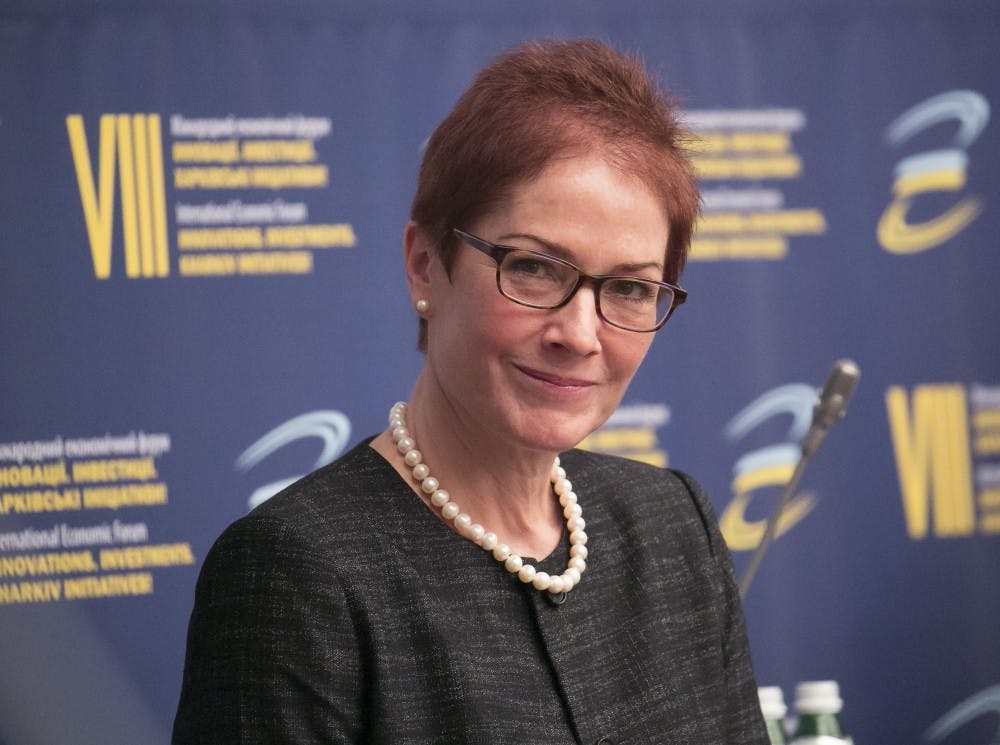In 2019, former Ambassador to Ukraine Marie Yovanovitch ’80 was thrust into the national spotlight when she testified in former President Donald Trump’s first impeachment trial.
Now, at a panel titled “In the Nation’s Service,” Yovanovitch and Professor of Sociology and International Affairs Kim Lane Scheppele reflected on the United States's reputation abroad, Yovanovitch’s 2019 impeachment testimony, and state department reform.
Yovanovitch was critical of the Trump administration’s foreign policy during the panel.
“Our foreign policy needs to serve the American people,” Yovanovitch said. “What we have discovered over the last little while is that our policy has been animated and has been strong because of the example that we set here at home. So our current domestic turmoil has made us less influential abroad.”
“When we go overseas, when we talk to our counterparts, when we talk to foreign audiences, we need to own it,” she said about admitting to our nation's mistakes. “We have a lot of work and we need to do it now.”
For Yovanovitch, her testimony was about upholding accountability. She also set the scene for what the Ukrainian Embassy was working on at the time of the now-famous phone call between Trump and Ukrainian President Volodymyr Zelensky.
In the phone call — which later became a key piece of evidence in the impeachment trial — Trump attempted to leverage U.S. foreign aid in exchange for damaging evidence on the Biden family.
Yovanovitch explained that when the phone call came, the Embassy was working with the Ukrainian government to push forward an anti-corruption agenda.

She also expressed the importance of keeping public servants safe.
“No public servant should ever be threatened by an American President,” Yovanovitch said. “It’s just not right. That doesn’t mean public servants shouldn’t be held accountable, that’s just not the way to do it.”
When asked what lessons were learned during the first impeachment process, she explained what she believed to be inherent shortcomings in our current democratic system — namely, the fact that these proceedings do not involve the judicial branch.
“The Republican Senate in place at the time was not going to convict President Trump,” she noted. “That was pretty clear to most observers.”

Yovanovitch connected the behavior of Republican senators to the murder of George Floyd in May 2020, and explained that the same “broken” systems were at work in both cases.
“The question for me became, ‘How many Republican Senators are going to be willing to hold the President accountable?’ The answer was one,” Yovanovitch said. “I think that sent the president a message. And what we saw in the months after that decision by the Senate — we saw a pandemic, and then we saw unrest on the streets after the murder of George Floyd. We saw the same kind of leadership, and frankly the same kind of self-dealing, continue. I think that’s the lesson of the first impeachment.”
In an October 2019 article published in The New York Times, Yovanovitch is quoted expressing the need to revitalize the State Department.
She explained in Wednesday’s panel that the restoration of the State Department and the redefinition of its mission to fit 21st century needs is a “national security priority.”
Yovanovitch closed the panel with what she believes her career in foreign service has taught her about keeping open discourse.
“It’s about listening, and understanding and listening deeply for comprehension,” Yovanovitch said. “For understanding. For figuring out what this person is telling us and why? Not always trying to fill the gap of silence with ‘I’m going to demolish this argument and that argument.’ To listen to bridge that gap for both parties.”
The panel was held on March 31 at 5 p.m., and was co-sponsored by the Princeton School of Public and International Affairs and the Program in Russian, East European and Eurasian Studies as a part of the Walter E. Edge lecture series.








